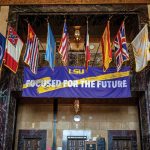Adjusting to college life doesn’t happen easily for everyone. This is especially true for veterans who may leave active duty for higher education. Often, nursing students who are veterans discover that the routines, resources and familiar camaraderie they are used to no longer apply. This disconnect can result in difficulty readjusting and failure to graduate.
Student veterans at the LSU Health School of Nursing now have a resource to help them overcome those challenges and thrive in pursuing their degrees. The school’s National Student Veterans of America (SVA) chapter was commissioned in August 2022.
“The chapter provides military-affiliated students and families the resources to adapt and overcome transitions in nursing higher education. Beyond that, we provide them a network for educational, professional and social opportunities designed to help them to continue selfless service beyond graduation,” explains Celestine Carter, APRN, DNS, Assistant Professor of Clinical Nursing and Chapter Advisor. “We want to empower our military-affiliated students to lead and live their best lives while adapting and overcoming transitions in nursing higher education.”
Helping Veterans Thrive on Campus
When military veterans transition onto a college campus, they often face challenges that nonmilitary students don’t have to manage. Veterans who are nursing students may find that their typical support structure is gone, so they need help building social networks, navigating campus life and managing Department of Veteran Affairs (VA) benefits. If they are deployed and have to miss class and clinical experiences, active-duty nursing students need guidance on how to stay current with their studies. In addition, the generally intense military life is vastly different from college life, and that difference can be overwhelming.
“There are many transitions we as military veterans need to make in order to pursue our nursing education. SVA provides help with those transitions, and even more importantly, a vital network of people who understand where we are coming from.”
Marshay Stevenson, Army National Guard Specialist, 68W, and SVA Chapter President
Despite these challenges, military-affiliated students bring great value to any campus. Veteran and military-affiliated nursing students help increase cultural diversity and bring new perspectives to academia. Veterans also bring valuable teamwork and communication skills to nursing education.
“Three percent of the current study body at LSUHSC identify as veterans or veteran affiliates,” Dr. Carter explains. “Their military background allows them to bring diverse talents and experiences that enrich our campus and the nursing profession.”
Dr. Carter speaks from experience. She is proud to apply her 28 years of service as an Army nurse trained to provide care for soldiers in hospitals, clinics and battlefield environments to teach at the School of Nursing.
“As a LSUHSC School of Nursing graduate and an Army Nurse Corps officer, I felt that I possessed unique skills that could help train our future RNs,” she adds. “I paid it forward by obtaining my advanced degrees and applying to the LSU Health School of Nursing as an instructor. Since becoming an instructor, I put my best foot forward to train student nurses to conduct evidence-based research and provide excellent, patient-centered care in all environments.”
As the SVA faculty advisor, Dr. Carter intends to build faculty and student interest and trust in the SVA and recognition for the individualized support veterans or military-affiliated students need to thrive on campus. “I am proud to apply my abilities in mentorship, coaching and financial planning to support our chapter and our members,” she says.
A Central Point for Military Community
The School of Nursing SVA chapter is one of more than 1,500 on-campus chapters representing more than 750,000 student veterans across the nation and in three countries. For many members, the chapter provides a foundation and support to help them feel like they belong.
“SVA is a real resource and central point for the military community here on campus,” says Marshay Stevenson, Army National Guard Specialist, 68W, and Chapter President. “There are many transitions we as military veterans need to make in order to pursue our nursing education. SVA provides help with those transitions, and even more importantly, a vital network of people who understand where we are coming from.”
Dalton Tollner knows all about those transitions. As a senior medic in the 82nd Airborne Division, pursuing a nursing degree was a new career perspective. “I was fresh out of that military atmosphere and the younger college atmosphere was really jarring at first. It’s been comforting to be around other prior service students who knew what I was going through and had similar goals,” he says.
When Stevenson tapped Tollner for a leadership role in the SVA chapter, Tollner was only too happy to volunteer as the chapter’s public relations liaison. “I want to be part of bringing that camaraderie and encouragement to other military-affiliated students here,” he says.
After only a few months of being on campus, the chapter’s membership recruiting efforts have been very successful. “We currently have 17 members. When considering the military population on campus is not huge, 17 members is a huge accomplishment,” Stevenson says.
Chapter leadership is excited to coordinate a trip to the SVA Annual Convention in 2023, taking advantage of the opportunity to share ideas and best practices with other chapters. “Being able to meet other members in person and share ideas about how to progress our chapter would be huge for us, so we’re doing our best to make sure that happens,” Tollner says.
Any School of Nursing student enrolled in at least one credit hour who is a veteran, reservist, National Guard or active-duty service member is eligible to join the chapter. School of Nursing graduates who are veterans, reservists, National Guard or active-duty service members are eligible to be alumni members. Learn more about the chapter.







